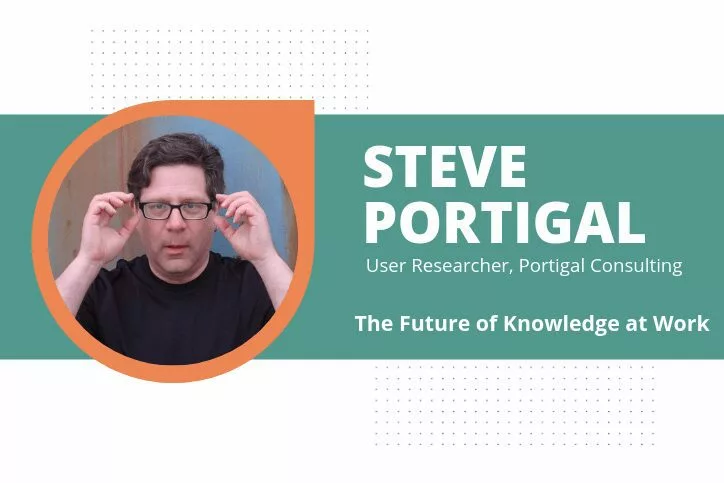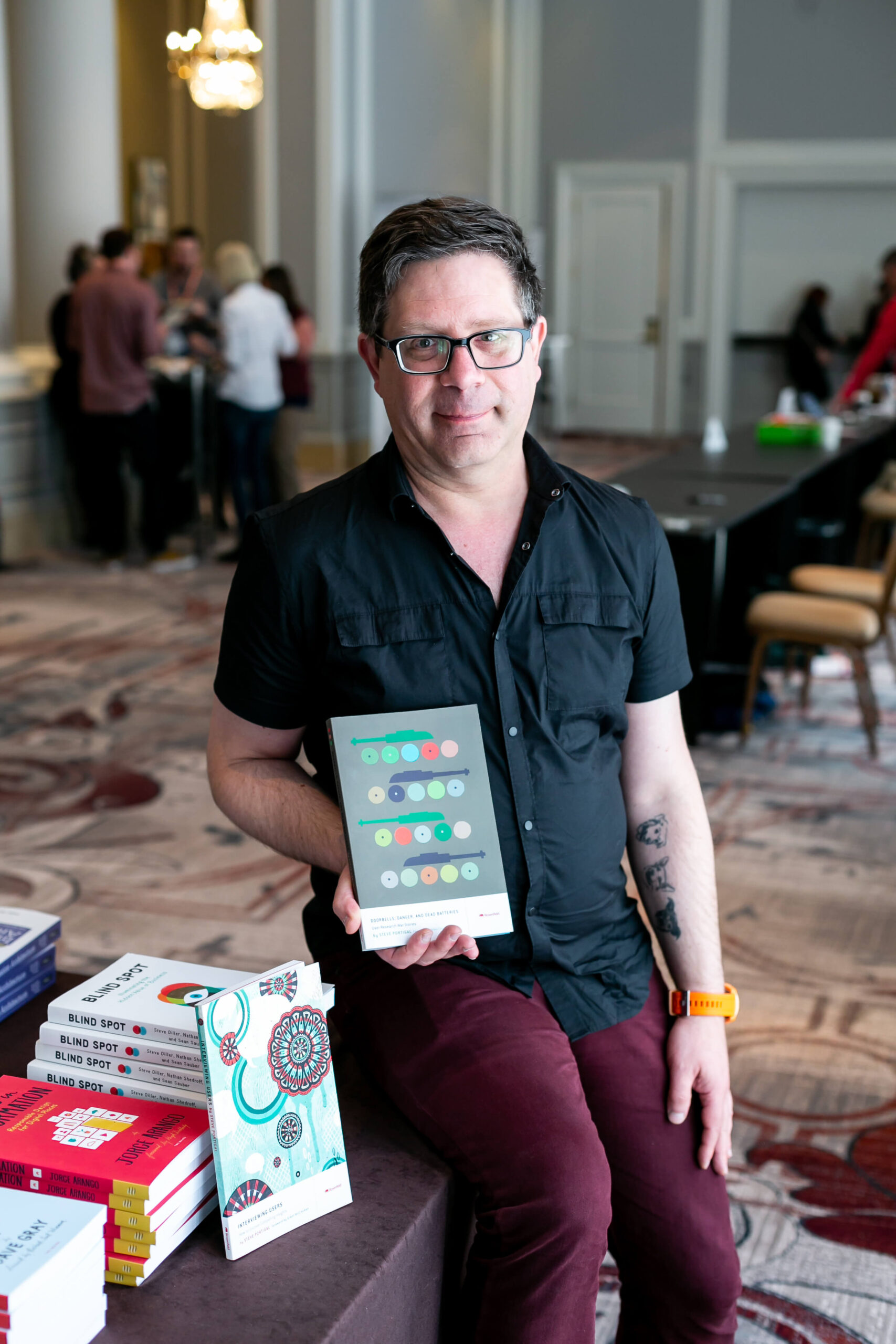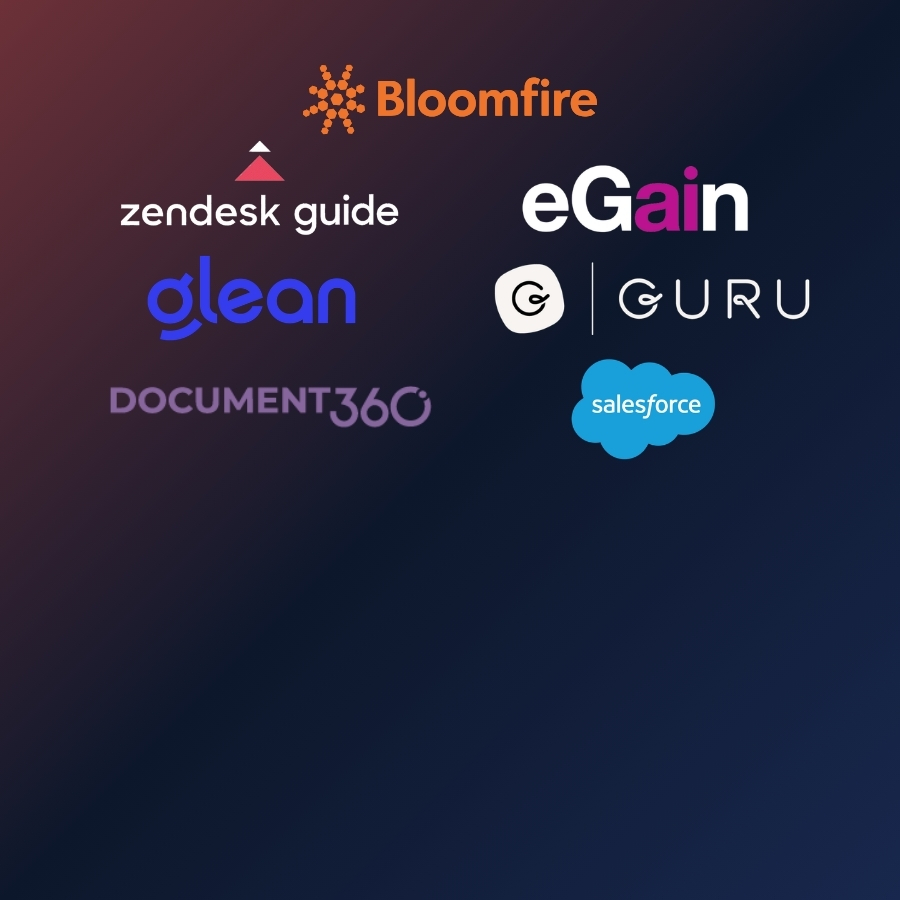Bloomfire Q&A: Steve Portigal on Reusable Research, Interview War Stories, and Letting Go of Implicit Beliefs

As just about any market research professional would be quick to tell you, their job isn’t just about conducting research: it’s about disseminating what they learn to the stakeholders who need that information to make informed decisions. As a result, successful market researchers spend a lot of time thinking about how to share their knowledge in the most impactful way possible.
It seems fitting then, that the second entry in our Future of Knowledge at Work series features Steve Portigal, a researcher (as well as an author and podcaster) who has built his career on helping businesses better understand the people who use their products or services.
Tell us a little about yourself.
I’m a user researcher, and I’ve run my own consulting practice since 2001. I lead user research efforts for teams, and I also serve as a coach for teams doing their own research, and I also teach organizations how to improve their research skills. I live in a small, foggy coastal town just outside of San Francisco where there are lots of trails for walking my dog.
How did you get started in your career as a user researcher, and what led you to start your own consultancy?
After graduate school I ended up at a small consultancy that was experimenting with user research as a service that could bring value to their clients, and I was able to get on board in those early days. I have always liked consulting for the variety and how that provides continuous learning opportunities about almost everything I do. So when that agency failed to make it through the stock market crash, it seemed like the obvious next step to go out on my own.
What knowledge do you rely on most to do your job?
As a user researcher, I’m usually working with knowledge from two different groups— the team that makes something (or wants to make something), and the people that the team hopes will buy or use that thing. My job is to uncover and synthesize new knowledge about both parties (e.g, how is this artifact or service understood, how is it being used, and how might it be used?) and then work to resolve the gaps between them.
In your experience working on research projects for your clients, what do you think are the biggest knowledge management challenges (and how do you solve them)?
There’s often a certain amount of anxiety about the data (say, recordings and transcripts of user research sessions), but the knowledge is the key to having the research be impactful and lead to meaningful change. But that change can be painful, as it means letting go of previously held beliefs. It’s especially difficult with those that are implicit beliefs.
To have the most impact, I share anecdotes and examples along the way— not to present patterns and conclusions too early, but to introduce the rest of the team to the real people whose stories are the basis of the work that we’re doing, and then I work collaboratively with them to take apart and reassemble all that data into knowledge. Being part of that process— which is messy and divergent at points— really makes them the owners of the new knowledge that we’re creating. And then, we work to transform knowledge into (potential) actions.
To have the most impact, I share anecdotes and examples along the way— not to present patterns and conclusions too early, but to introduce the rest of the team to the real people whose stories are the basis of the work that we’re doing.
Thoughts on how new technologies will impact the way researchers manage and share their results?
This is such a hot topic among growing research teams. The need is evolving from sharing results and archiving, to really building up a collection of data and knowledge that can be revisited. Siloed research and repetitive research are inefficient and hurt the cause of bringing research into every part of the organization, so the more the work of researchers (from data through results) can be made accessible and reusable, the more impact research can have inside the organization.
The more the work of researchers can be made accessible and reusable, the more impact research can have inside the organization.
What best practices would you recommend for capturing and sharing knowledge?
When I work with people who are new to doing research, I urge them to record their user research interview sessions. People think that they’re pretty good note-takers, but for research, you need to capture exactly what people say, and you can’t take notes quickly enough to do that. In the moment is not the time to be editing and interpreting.
If you record the research, then you have a high-fidelity record that can be transcribed and then can be both analyzed (e.g, pulling out key quotes, examples, anecdotes) and synthesized (e.g., arranged into new themes, frameworks, opportunities). It’s crucial that people have a good model for how to treat the knowledge that they are building in this process and that they understand when and how to emphasize the customer’s point of view, and when and how to insert their own interpretive point of view.
Can you tell us a little about your book Doorbells, Danger, and Dead Batteries?

I wrote a book called Interviewing Users that is a pretty solid introduction to (go figure) interviewing users. I’ve long been interested in the fascinating experiences that researchers have going into people’s lives, physically going into homes and workplaces and other environments. Sometimes things go wrong in amazing ways. We have encounters that are hilarious, embarrassing, distressing, confounding, and more. These become stories that researchers share informally, but I hadn’t ever seen anyone collect these stories, let alone reflect on how these stories can be used to teach us about the practice of research.
As part of writing Interviewing Users, I set up an online channel for documenting these war stories. Now, as much as we create structure and rigor and tools around the work of research, there’s an element we can’t control—we’re meeting other people in their space. But that’s the beauty of research: these experiences teach us and change us. Doorbells, Danger, and Dead Batteries collects the stories of 65 researchers from around the world and unpacks the lessons they provide.
Can you tell us a bit about your podcast, Dollars to Donuts, and what inspired you to start it?
Dollars to Donuts features interviews with people who are leading in-house research teams. As companies have invested more in user research, there’s now more people in research-specific leadership roles. This is something that didn’t exist until recently. I wanted to discover and share their stories and best practices as an extension to the consulting work I do with many different teams.
If you enjoyed this interview, check out the first entry in our Future of Knowledge at Work Series:
Jeff Miller on Promoting Change and Distributing Knowledge to Workers in the Field

How to Improve Customer Service: 9 Strategies to Automate Success

7 Best Customer Service Knowledge Management Systems in 2026

The 6 Knowledge Management Trends That Redefine Strategic Intelligence in 2026

Estimate the Value of Your Knowledge Assets
Use this calculator to see how enterprise intelligence can impact your bottom line. Choose areas of focus, and see tailored calculations that will give you a tangible ROI.

Take a self guided Tour
See Bloomfire in action across several potential configurations. Imagine the potential of your team when they stop searching and start finding critical knowledge.